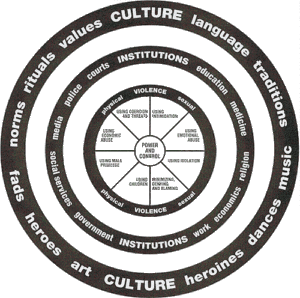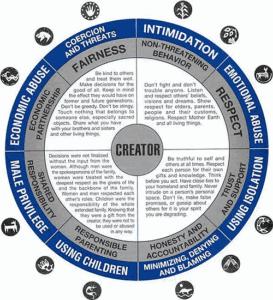RESOURCES
Alaska Native Women’s Resource Center (AKNWRC) – provides targeted technical assistance and training to develop and implement culturally-tailored training and TA for remote Native villages in Alaska. AKNWRC is dedicated to strengthening local, tribal government’s responses through community organizing efforts advocating for the safety of women and children in their communities and homes, especially against domestic and sexual abuse and violence with their Alaska Curriculum.
International Association of Forensic Nurses NICCSA Project supplements and supports the work of the Southwest Center for Law and Policy (SWCLAP) NICCSA project. IAFN NICCSA provides technical assistance and training for tribal communities to assist in enhancing or establishing sexual assault coordinated community response models such as a Sexual Assault Nurse/Forensic Examiner (SANE/SAFE) project or a Sexual Assault Response Team (SART); technical assistance and training to tribal governments and tribal courts on effective responses to sexual assault through web-based technology, regional training and on-site assistance; and on programming and services to address the unique environmental, cultural and traditional needs for Alaska tribal governments and villages.
Minnesota Indian Women’s Sexual Assault Coalition (MIWSAC) – strengthens Native women’s voices and builds resources to create awareness and eliminate sexual violence against Indian women and children, while working to influence social change and reclaim traditional values that honor the sovereignty of Indian women and children. MIWSAC programs include: the Tribal Coalition and Training and Technical Assistance to OVW Tribal Sexual Assault Services Program grantees, Project Beacon grantees.
National Congress of American Indians (NCAI) – Through their comprehensive T/TA project, NCAI provides technical assistance, training and support to OVW Tribal Jurisdiction grantees and potential grantees to plan, develop and implement changes in their criminal justice systems necessary to exercise special domestic violence criminal jurisdiction.
The National Indigenous Women’s Resource Center (NIWRC) – serves as the National Indian Resource Center (NIRC) Addressing Domestic Violence and Safety for Indian Women. NIWRC supports culturally grounded, grassroots advocacy and provides national leadership to ending gender-based violence for American Indian and Alaska Native (Native) tribes, Native Hawaiians, and Tribal and Native Hawaiian organizations through the development of educational materials and programs, direct technical assistance and the development of local and national policy that builds the capacity of Native communities and strengthens the exercise of tribal sovereignty.
Red Wind Consulting, Inc. – Red Wind Consulting’s vision is to strengthen Tribal programs and Native organizations’ ability to develop and enhance local responses to domestic violence, sexual assault and stalking through training and tribal technical assistance. Red Wind offers training on developing victim-centered and culturally appropriate shelters, safe homes, and transitional housing programs and technical assistance to build the capacity of Tribes in the development and implementation of their shelter, safe-home or transitional housing policies and procedures. They also provide technical assistance and training to improving victim services and justice responses to Urban Native populations, as well as Tribal College Campus (TCC) training and technical assistance, and provide comprehensive T/TA to Tribal Government Program grantees.
Qizhjeh Heritage Institute – (QHI) offers training and technical assistance (TTA) to provide OVW tribal program grantees and tribal coalitions with hands-on training and tools to design, develop and deploy communications materials to address violence against women in Native communities.
Southwest Center for Law and Policy (SWCLAP) – SWCLAP works across jurisdictions to develop comprehensive, interdisciplinary responses to violence in Indian country. Their staff of skilled trial attorneys has decades of experience working with tribal, state, and federal court systems and provides legal training and technical assistance to tribal communities and to organizations and agencies serving Native people. SWCLAP is the host of the National Tribal Trial College providing free legal training for attorneys, judges, law enforcement, advocates and community members on violence against Native women issues. Other projects include: SAFESTAR, a tribal community sexual assault services training program.
Tribal Law and Policy Institute (TLPI) – TLPI facilitates the sharing of resources so that Indian Nations and tribal justice systems have access to cost effective resources which can be adapted to meet the individual needs of their communities. They strive to establish programs which link tribal justice systems with other academic, legal, and judicial resources such as law schools, Indian law clinics, tribal colleges, Native American Studies programs, Indian legal organizations and consultants, tribal legal departments, other tribal courts, and other judicial/legal institutions.
Call this number to be connected with a local rape crisis center:
1-800-656-HOPE (4673)
IHS Hotline for Reporting Child/Sexual Abuse:
1-855-SAFE-IHS (855 723-3447)
Alaska CARELINE:
1-877-266-4357
Tribal Resources:
StrongHearts Native Helpline (1-844-7NATIVE) – The StrongHearts Native Helpline (1-844-762-8483) is a safe, anonymous and confidential service for Native Americans affected by domestic violence and dating violence. Advocates are available at no cost 24/7 when you are ready to reach out. StrongHearts offers immediate peer-to-peer support, crisis intervention, safety planning and referrals to culturally-appropriate resources. Visit strongheartshelpline.org for more information on abuse types and behaviors.
The National Advocacy Center (NAC) – The National Advocacy Center (NAC) is operated by the Department of Justice, Executive Office for United States Attorneys. The facility is located on the campus of the University of South Carolina. Over 20,000 personnel are trained annually in advocacy skills and management of legal operations.
Tribal Court Clearinghouse – Links and information, including Tribal Courts, Tribal Constitutions and Tribal Codes.
Federal Court Decisions – This page provides links to all Federal Courts and case summaries of Indian law cases decided by the United States Supreme Court from 1991 through 2008 with links to the court syllabus, the full opinions for each case, and all dissents. This page also contains information concerning Indian law cases pending before the U.S. Supreme Court during the current term.
Sexual Assault:
Minnesota Indian Women’s Sexual Assault Coalition (MIWSAC) – works to strengthen the voices of Native women around the issue of sexual violence and build resources to create awareness and eliminate sexual violence against Indian women and children, including influencing social change and reclaiming traditional values that honor the sovereignty of Indian women and children. MIWSAC also provides comprehensive technical assistance and training to OVW Tribal Sexual Assault Services Program grantees nationwide that are working to address sexual assault in their communities.
National Indian Country Clearinghouse on Sexual Assault (NICCSA) – A project of Southwest Center for Law & Policy, the NICCSA strives to be a one-stop, comprehensive source for information on sexual violence in Indian Country. The NICCSA website offers information on important federal legislation, tribal codes, cutting edge articles by Indian Country experts, and funding opportunities, as well as monthly features of innovative practice tips by seasoned advocates and legal professionals.
National Indian Country Clearinghouse on Sexual Assault – Alaska (NICCSA Alaska) – A project of Southwest Center for Law & Policy, NICCSA Alaska offers information and resources on sexual violence affecting Native Alaska Native women.
SAFESTAR (Sexual Assault Forensic Examinations, Services, Training, Advocacy, and Resources) – designed to help American Indian/Alaska Native communities currently without the capacity to support universal access to SANE services, by providing intensive training and technical support to specially selected laypersons and traditional healthcare providers to: deliver emergency first-aid to SA victims; provide referrals for follow-up medical and other care; collect forensic evidence to promote increased accountability for perpetrators; and educate communities on the harm done by sexual violence.
The National Sexual Violence Resource Center (NSVRC) – is a comprehensive collection and distribution center for information, research and emerging policy on sexual violence intervention and prevention. It provides an extensive on-line library and customized technical assistance, in addition to coordinating National Sexual Assault Awareness Month initiatives.
Pennsylvania Coalition Against Rape (PCAR) – is an organization working at the state and national levels to prevent sexual violence, providing quality services to victims/survivors of sexual violence and their significant others. Their site contains statistics and information on: sexual violence, ways to stop rape, public policy, statutes, legal advocacy, medical advocacy and several resources.
Rape, Abuse and Incest National Network (RAINN) – is the nation’s largest anti-sexual assault organization. RAINN operates the National Sexual Assault Hotline at 1-800-656-HOPE and carries out programs to prevent sexual assault, help victims and ensure that rapists are brought to justice. Their website offers statistics, counseling resources information, prevention tips, news and more.
Tribal Forensic Healthcare Project – delivers training on the identification, collection, and preservation of medical forensic evidence obtained during the treatment of victims of sexual and domestic violence. Trainings allow medical professionals to acquire and maintain the knowledge, skills, and competent clinical forensic practice to improve the response to domestic and sexual violence in hospitals, health clinics, and health stations within the Indian health system.
International Websites:
Amnesty International – Stop Violence Against Women – This site focuses on Amnesty International’s campaign to end violence against women.
Cornell Law School Global Legal Resources – This site contains national law with links by continent. It also contains United Nation materials (including treaties), and International Court of Justice opinions.
VIOLET: Law & Abused Women – Provides information and interactive services to meet the legal needs of abused women and service providers in Alberta and Canada.
United Nations Permanent Forum on Indigenous Issues – The UN Permanent Forum on Indigenous Issues is an advisory body to the Economic and Social Council, with a mandate to discuss indigenous issues related to economic and social development, culture, the environment, education, health and human rights.
Mending the Sacred Hoop, Inc. is a Native-led non-profit organization dedicated to addressing and ending violence against Indigenous women. We organize on issues surrounding violence against American Indian/Alaska Native women in our home community of Duluth, MN and throughout the State of Minnesota. Nationally we work with Tribes and Native communities that are addressing the issues of domestic and sexual violence, dating violence, sex trafficking and stalking in their communities. We provide training to strengthen Tribal and Native community responses to these crimes, including advocacy and systems responses, community understanding and awareness, engaging men in the work to end violence against women, and coordinating community responses that provide for survivor safety and uphold offender accountability.
OUR MISSION
Mending the Sacred Hoop works from a social change perspective to end violence against Native women and children while restoring the safety, sovereignty, and sacredness of Native women. We are dedicated to strengthening the voice and vision of Native peoples. Our approach is founded on grassroots organizing within communities, restoring the leadership of Native women in addressing domestic and sexual violence.



